Browse Items (45 total)
| Thumbnail | Title | Description | Date | Date Added |
|---|---|---|---|---|
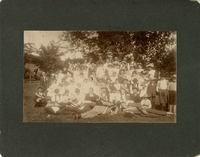 |
Members of the Italian-American Alpina Dogali Society with their families in Collinsville | This is is a photograph of members of the Alpina Dogali Society, an organization for Italian Americans. Men, women, and children are seated in the photo, with the men wearing sashes and ribbons. | Circa 1900 - 1910 | September 17, 2017 |
 |
Michael Torosian Oral History Interview | This oral history interview with Michael Torosian was part of oral histories conducted in the fall 2001 semester of History 447: Oral History. Mr. Torosian is a first-generation American. His father emigrated from Armenia in 1913. His mother was a refugee; she emigrated sometime after the genocide of the Armenians in 1915. Mr. Torosian was born in Lincoln Place and describes growing up there as the most wonderful childhood anyone could have. He lived there for the first twenty-nine years of his life, excluding the time he was in the service. Mr. Torosian indicated that the community center played a major part in his life as a child. He states that from the age of eight or nine, he was there almost every night. He stated that the Community Center was the envy of the surrounding area. The combination of caring people, citizenship classes, sewing classes and a beautiful basketball gymnasium made the center a wonderful place. Additionally, the fact that it was paid for by Mr. Howard and constructed with local labor provided employment for many families in Lincoln Place during the depression. Mr. Torosian described the mix of different ethnic groups as educational. Lincoln Place provided the structure for education about many different cultures. Everyone learned from each other. The sense of community was very evident in Lincoln Place. Mr. Torosian and I also discussed the Armenian Genocide and issues surrounding its lack of acknowledgment and publicity. He graciously states that genocide was the responsibility of the regime in charge at the time, and not all the Turks. |
November 15, 2001 | March 18, 2018 |
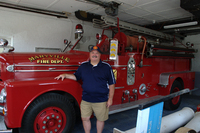 |
Mike Picchioldi Oral History Interview | In this oral history interview, Mike Picchioldi describes his experiences as a firefighter in Maryville and Edwardsville. He highlights his involvement with the Maryville historical society and his role in helping to preserve its history. He highlights the histories of Chinatown, the Donk Brothers Mine, the Homecoming Parade, as well as his grandparents mercantile business. | July 10, 2017 | October 9, 2017 |
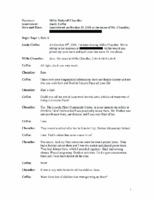 |
Millie Chandler Oral History Interview | This oral history interview with Millie Chandler was part of oral histories conducted in the fall 2001 semester of History 447: Oral History. Millie Chandler was born and raised in Lincoln Place until she moved in 1951. In this interview, she describes her childhood, the diversity of the community, playing music in the community center, and how she felt outside communities viewed those that resided within Lincoln Place. |
October 29, 2001 | February 20, 2018 |
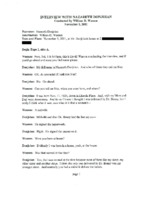 |
Nazareth Donjoian Oral History Interview | This oral history interview with Nazareth Donjoian was part of oral histories conducted in the fall 2001 semester of History 447: Oral History. Naz, as he is better known by, was bom November 22, 1924. His father was a chef and ran a tavern and boarding house for many years. Naz also owned and ran a tavern for a number of years. While in high school, Naz got a job at the U.S. Army depot just down the street and worked there for part of his senior year. After graduation, he worked there a short period of time at the depot before being drafted, he entered the U.S. Army in June 1943 and was assigned to the U.S. Army Air Corps. He received training as a airplane and engine mechanic and spent a total of32 months in the military. The war ended before he was shipped overseas and upon discharge he returned to Granite City. He had return rights to his former job at the depot. After being home for two weeks and listening to his dad constantly asking him when he was going to get a job, Naz returned to work a the depot. He held a number of jobs and over the years suffered a number of Reduction In Force (RIF) realignments of personnel. However, after each RIF he was fortunate enough to move up in pay grade and after forty two years of combined military and civilian service, retired as a GS-12. |
November 3, 2001 | February 20, 2018 |
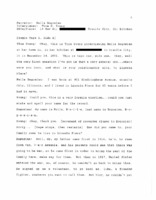 |
Nelle Bogosian Oral History Interview | This oral history interview with Nelle Bogosian was part of oral histories conducted in the fall 2001 semester of History 447: Oral History. Nelle Bogosian was born to Armenian parents and spent most of her life in Lincoln Place. In this interview, she talks about her parent’s escape from the Armenian Genocide and lack of US recognition for the event, her schooling and social experiences in Lincoln Place, the community center, pool hall, and different cultural celebrations within the Lincoln Place community. |
November 1, 2001 | February 20, 2018 |
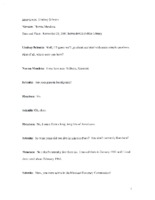 |
Norma Mendoza Oral History Interview | This oral history interview with Norma Mendoza was part of oral histories conducted in the fall 2001 semester of History 447: Oral History. Norma Mendoza moved to Lincoln Place after she got married in 1960 and lived there until 1966. In this interview, she describes her experience working with the Mexican Honorary Commission, the diversity of the community, food and entertainment within the community, arranged marriages, different aspects of her career, and the local army depot. |
November 28, 2001 | March 15, 2018 |
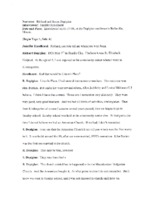 |
Richard and Susan Depigian Oral History Interview | This oral history interview with Richard and Susan Depigian was part of oral histories conducted in the fall 2001 semester of History 447: Oral History. Richard and Susan Depigian discuss life in Lincoln Place and their Armenian heritage. They share information about the customs and traditions, as well as the “clans” that developed out of, their heritage. The ethnic diversity of Lincoln Place is addressed. Both Richard and Susan discuss their parents experienced during the Armenian genocide. |
November 17, 2001 | February 20, 2018 |
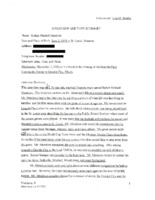 |
Ruben Mendoza Oral History Interview | This oral history interview with Ruben Michael Mendoza was part of oral histories conducted in the fall 2001 semester of History 447: Oral History. The interview centers on Mr. Mendoza’s life as a soccer player and coach. Mr. Mendoza begins his interview by painting a picture of what life was like living in Mexico, and his first encounters with the game of soccer at age ten. He moves back to Lincoln Place when he was sixteen. He tells about where soccer was being played back in the St. Louis area; describing his journey to the Public School Stadium where most of the soccer games were played. It was there that he reunited with his love for soccer, and decided to join a team in St. Louis. Mr, Mendoza tells about his experiences playing against teams from Germany, Mexico. Italy, and many others. There were two interviews conducted with Ruben Mendoza as part of the course. The other interview was conducted by Jennifer Haselhorst. |
October 28, 2001 | August 25, 2018 |
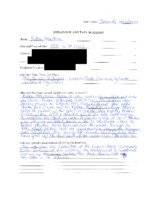 |
Ruben Mendoza Oral History Interview | This oral history interview with Ruben Mendoza was part of oral histories conducted in the fall 2001 semester of History 447: Oral History. In this oral history interview, Ruben Mendoza discusses his career as a soccer player and coach. He describes growing up in Lincoln Place and moving to Mexico at the age of eight in the late 1930s, where he discovered soccer. After moving back to Lincoln Place, he played soccer for St. Louis teams and played for the United States in the 1958 World Cup and in the 1952, '56, and '60 Olympics. He also discusses how he expanded soccer programs in Lincoln Place, Granite City, and the larger Metro East region as a coach starting in the 1960s. This interview had no transcript in the original archive. It was transcribed by Madison Historical staff. There were two interviews conducted with Ruben Mendoza as part of the course. The other interview was conducted by Lisa Smithe. |
October 30, 2001 | September 2, 2018 |
